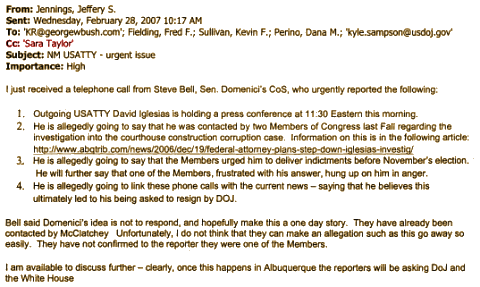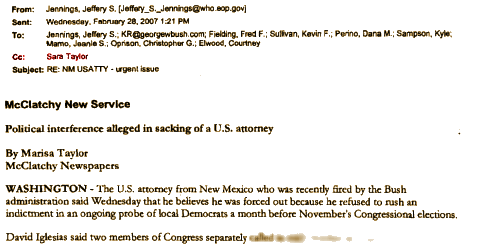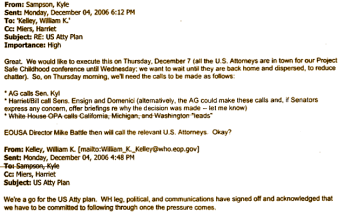Posted on Saturday 2 June 2007
So all of the Iraq maneuvering was merely for show to appease the antiwar left that elected Democrats. Ms. Pelosi couldn’t even deliver a majority of her own Members for the war spending bill, and she voted "no" herself. Thus she can claim to oppose the war but also sleep easily knowing that others voted to fund it. The troops will be funded because 194 Republicans joined 86 Democrats to support it. Two Republicans and 140 Democrats opposed it.
At least Majority Leader Reid voted for the bill, which passed 80-14 in the Senate. To his credit, so did Joe Biden. But the main story in that body was the "no" votes by Presidential candidates Chris Dodd, Barack Obama and Hillary Rodham Clinton. The vote won them praise from the likes of MoveOn.org, which threatened not to support anyone who voted for the bill. "Senators Obama, Clinton and Dodd stood up and did the right thing–voting down the President’s war policy," said Eli Pariser, MoveOn’s executive director. "They’re showing real leadership toward ending the war, and MoveOn’s members are grateful. This bold stand . . . won’t soon be forgotten."
We hope he’s right about that last part. Here are three politicians bidding to be Commander in Chief, and they vote to undermine U.S. troops in the middle of a difficult mission, albeit knowing like Ms. Pelosi that their vote won’t determine policy. Mr. Dodd and Mrs. Clinton both voted for the Iraq War resolution in October 2002, which means that they were for the war when it was popular but are against it now that public opinion has changed.
A confused Wall Street Journal editorial last week seemed to be addressing this question of how an elected representative might legitimately oppose a war in our democracy. It began by accusing House Speaker Nancy Pelosi and Senate Majority Leader Harry Reid of cowardice. They "claim to oppose the war and want it to end, yet they refused to use their power of the purse to end it."
So there is a "power of the purse," you see. Congress can cut off funds for a war that people don’t like. In this connection, older readers might recall the Iran-contra affair, in which sources of money were found to keep the contra war going in Nicaragua without Congress’s even knowing about it. This met with the enthusiastic approval of the Wall Street Journal, even though funds you do not know about are hard to cut off.
But what happens if you, as a member of Congress, do attempt to use the power of the purse? Sens. Clinton, Obama and Chris Dodd (also running for president) voted against the final Iraq funding bill because all meaningful deadlines and timetables had been stripped out so that President Bush would sign it. That Wall Street Journal editorial accuses these three Democratic senators of "vot[ing] to undermine U.S. troops in the middle of a difficult mission." If this is true of last week’s vote, it will always be true of any attempt to cut off a war by cutting off funds. Unless the Journal is in favor of undermining U.S. troops, this makes the alleged "power of the purse" unusable.
Advocates of the current war who enjoy the spectacle of war opponents caught in this trap of laws and logic had better hope that every military action a president chooses to engage in from here on out is as wonderful to them as is the war in Iraq. Because there is nothing war-specific about this line of argument. It would work just as well on an invasion of Canada or an aerial bombardment of Portugal. The president can do it if he wants to, and no one can legitimately stop him.
Of course, the president is elected, and in that sense he is acting as proxy for the citizens when he decides to take our country into a war. Right? Well, not quite. Let’s leave aside the voting anomalies of the 2000 election. When this president first ran for national office, he campaigned on a platform of criticizing his predecessor for engaging in military action (in Kosovo and Somalia) without an exit strategy. He mocked the notion of trying to establish democracy in distant lands. He denounced the use of American soldiers for "nation-building." In 2000, if you were looking for a way to express your disapproval of the policies and prejudices that later got us into Iraq, your obvious answer would have been to vote for George W. Bush.


 I kind of hope so. I don’t much like Isikoff’s phrase, "Will he play ball." It sounds like, "Will he turn against Bush and join up with the Democrats." That’s an absurd request. For example, James Comey, the man who told this story, is a principled Conservative. The key is "principled." So I don’t want Ashcroft to "play ball," I just want him to tell the truth. This country needs principled Conservatives. What we don’t need is unprincipled. inept know-it-all’s, which we have in great abundance. Comey winced at being the "darling of the Left." That’s part of the Bush craziness. I am a Liberal person. No question about it. But that’s not what drove me to be so rabid about this Administration. The thing that got me so riled up, is that I’m a Patriot. I actually believe in our form of government in spite of its flaws. I actually believe in checks and balances, and the Bill of Rights, and Separation of Church and State.
I kind of hope so. I don’t much like Isikoff’s phrase, "Will he play ball." It sounds like, "Will he turn against Bush and join up with the Democrats." That’s an absurd request. For example, James Comey, the man who told this story, is a principled Conservative. The key is "principled." So I don’t want Ashcroft to "play ball," I just want him to tell the truth. This country needs principled Conservatives. What we don’t need is unprincipled. inept know-it-all’s, which we have in great abundance. Comey winced at being the "darling of the Left." That’s part of the Bush craziness. I am a Liberal person. No question about it. But that’s not what drove me to be so rabid about this Administration. The thing that got me so riled up, is that I’m a Patriot. I actually believe in our form of government in spite of its flaws. I actually believe in checks and balances, and the Bill of Rights, and Separation of Church and State. An Answer: Disincentives, Deterrants, Negative Consequences, etc. are the natural and normal methods that parents use the point kids in the right direction. It just makes intuitive sense that if you want to move people in a certain direction, you make the correct direction pleasurable, and the alternative aversive. Parents do such things with reward/punishment schemes, but more often by first occupying a position of respect, then shaping behavior by subtle changes in parental approval levels. There are two kinds of authority. The first is the authority of power, like that of a Major over a Seargant [delegated authority] as in "by the authority invested in me by the…" The second kind is the authority of expertise, as in "Einstein was an authority in the field of…" I guess that’s why authority is derived from the word author. The optimal kind of authority is the second kind [backed up by an ability to use the first kind when necessary], as in "speak softly, but carry a big stick." Teddy Roosevelt said it in a
An Answer: Disincentives, Deterrants, Negative Consequences, etc. are the natural and normal methods that parents use the point kids in the right direction. It just makes intuitive sense that if you want to move people in a certain direction, you make the correct direction pleasurable, and the alternative aversive. Parents do such things with reward/punishment schemes, but more often by first occupying a position of respect, then shaping behavior by subtle changes in parental approval levels. There are two kinds of authority. The first is the authority of power, like that of a Major over a Seargant [delegated authority] as in "by the authority invested in me by the…" The second kind is the authority of expertise, as in "Einstein was an authority in the field of…" I guess that’s why authority is derived from the word author. The optimal kind of authority is the second kind [backed up by an ability to use the first kind when necessary], as in "speak softly, but carry a big stick." Teddy Roosevelt said it in a  Condi is easy to forget these days. My fantasy is that she’s moving around the globe to avoid being subpoenaed by the Congressional Committees. But as to her comments about being supported by Dick Cheney, tell it to the Marines. They continue to talk like they are a real government with some kind of plan. That’s simply not believable. I think all of them except Cheney are faking it – moving from Talking Point to Talking Point with little else going on. And as for Cheney, he’s nuts. They’ve avoided diplomacy with Iran for six and a half years. When somebody finally came to the table last week, our guy came out with some kind of pseudo-tough talk. I don’t think they know what diplomacy is. I can’t recall a single diplomatic moment from the time Bush took office. They deal with others the same way they deal with us – tell us how they want things to be, and that’s it. We’re stuck with them and have to put up with it for another 598 days. Other people can just walk away…
Condi is easy to forget these days. My fantasy is that she’s moving around the globe to avoid being subpoenaed by the Congressional Committees. But as to her comments about being supported by Dick Cheney, tell it to the Marines. They continue to talk like they are a real government with some kind of plan. That’s simply not believable. I think all of them except Cheney are faking it – moving from Talking Point to Talking Point with little else going on. And as for Cheney, he’s nuts. They’ve avoided diplomacy with Iran for six and a half years. When somebody finally came to the table last week, our guy came out with some kind of pseudo-tough talk. I don’t think they know what diplomacy is. I can’t recall a single diplomatic moment from the time Bush took office. They deal with others the same way they deal with us – tell us how they want things to be, and that’s it. We’re stuck with them and have to put up with it for another 598 days. Other people can just walk away… But there’s more. U.S. Attorneys oversee the election process itself. If there’s something fishy, they’re the ones to do something about it. If there’s something contested, they’re involved in investigating it. They have a lot of control over the elections, and I expect that’s the main motive in all of this. Rove’s big guns – Monica Goodling, Sara Taylor, Tim Griffin, Bernard Schlozman, etc. are all involved, and they’re all veterans of the Republican "opposition research" ranks. They’re part of the DoJ initiative for reasons, not all of which are apparent to us as of yet.
But there’s more. U.S. Attorneys oversee the election process itself. If there’s something fishy, they’re the ones to do something about it. If there’s something contested, they’re involved in investigating it. They have a lot of control over the elections, and I expect that’s the main motive in all of this. Rove’s big guns – Monica Goodling, Sara Taylor, Tim Griffin, Bernard Schlozman, etc. are all involved, and they’re all veterans of the Republican "opposition research" ranks. They’re part of the DoJ initiative for reasons, not all of which are apparent to us as of yet. The U.S. Justice Department has notified Arkansas’s congressional delegation that Interim Eastern District U.S. Attorney Tim Griffin is resigning effective Friday, June 1. Jane Duke will become acting U.S. attorney. (This is the assistant in the office who the Justice Department once had said had to be passed over as an interim appointee because of her pregnancy. Since it’s illegal to discriminate on account of pregnancy, Justice had to back off this statement.)
The U.S. Justice Department has notified Arkansas’s congressional delegation that Interim Eastern District U.S. Attorney Tim Griffin is resigning effective Friday, June 1. Jane Duke will become acting U.S. attorney. (This is the assistant in the office who the Justice Department once had said had to be passed over as an interim appointee because of her pregnancy. Since it’s illegal to discriminate on account of pregnancy, Justice had to back off this statement.)





